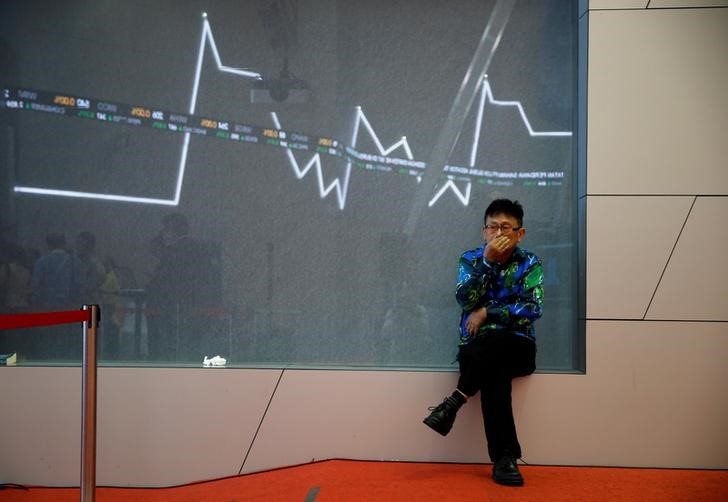 © Reuters. A man sits inside trading floor of the Indonesia Stock Exchange building in Jakarta
© Reuters. A man sits inside trading floor of the Indonesia Stock Exchange building in JakartaBy Patturaja Murugaboopathy
(Reuters) – Foreigners cut their exposure to Asian bonds in February as a rise in U.S. Treasury yields and fears about U.S. trade protectionist steps undermined demand for the region’s debt.
Data from central bank and bond market associations showed foreigners sold over $3 billion in India, Indonesia, Thailand and Malaysian bonds in the last month, compared with purchases of about $7 billion in January.
(For a graphic of foreign flows into Asian bonds click http://reut.rs/2Hz6UX0)
The selloff in regional bonds came as U.S. Treasury yields rose closer to 3 percent the last month, a level not seen since the end of 2013.
“The February selloff in Asian bonds wasn’t an isolated (incident) but a global phenomenon led by expectations of accelerated monetary tightening by developed market central banks, especially the U.S. Fed,” said Prakash Sakpal, ING Asia economist in Singapore.
Indonesian bonds saw the biggest foreign outflows of over $2.5 billion in February, despite some positive sentiment over its inclusion to a global index from June this year.
Malaysian bonds experienced outflows of over $1 billion, after attracting inflows in the previous three months.
Bucking the trend, South Korean bonds lured foreign money of over $2.5 billion as geopolitical tensions on the Korean peninsula abated last month.
After months of escalating tensions over Pyongyang’s advancing nuclear and missile programs, U.S. President Donald Trump agreed to accept an invitation from the North Korean leader to meet by May.
Thai and Indian bonds saw foreign outflows of about $500 million and $30 million respectively in February.
Analysts said U.S. trade protectionism could restrict foreign inflows into the region in coming months. Earlier this month, Trump announced he would impose hefty tariffs on imported steel and aluminum to protect U.S. producers.
South Korea is the No. 3 steel supplier to the United States after Canada and Brazil and would be the hardest hit by the tariffs. Other Asian suppliers are Japan, Taiwan and India.
“General sentiment is likely to stay cautious amid fears of a full-blown trade war, said Christopher Wong, an FX strategist with Maybank.
“But if such concerns wind down, we should expect inflows to the region to resume.”
Fusion Media or anyone involved with Fusion Media will not accept any liability for loss or damage as a result of reliance on the information including data, quotes, charts and buy/sell signals contained within this website. Please be fully informed regarding the risks and costs associated with trading the financial markets, it is one of the riskiest investment forms possible.
Source: Investing.com




























